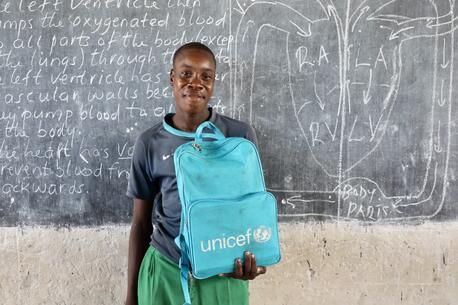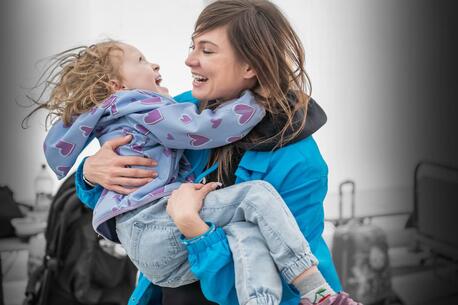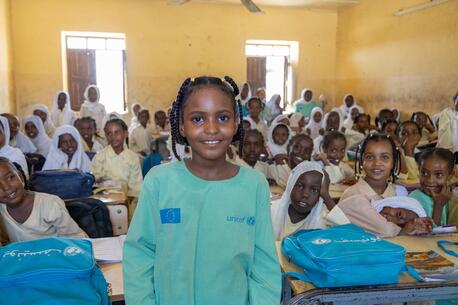
'I Am Human Like Everyone Around Me'
A scholarship from the K.I.N.D. (Kids in Need of Desks) Fund is helping 15-year-old Deborah get a quality high school education and challenge dangerous myths and misconceptions about people with albinism in Malawi.
It was just three months after her mother's death in 2021 that Deborah, now 15, received some welcome news: She had been selected as a recipient of a K.I.N.D. (Kids in Need of Desks) scholarship that would allow her to attend high school.
A partnership between UNICEF and MSNBC now in its thirteenth year, the K.I.N.D. Fund provides desks for school children in Malawi, and scholarships to help girls complete their secondary education. Public primary school is free in Malawi, but secondary school is not. Less than half of Malawi's girls complete elementary school; early marriage and teen pregnancy cut many educations short. The national high school graduation rate for girls is just half the boys' graduation rate.
Persons with albinism face discrimination and violence in Malawi
Deborah joined Ngabu Secondary School, a boarding school in Chikwawa District, southern Malawi, amid a series of discriminatory attacks on persons with albinism — a congenital absence of pigment in the skin, hair and eyes. Albinism can also cause poor eyesight; many students require additional support to ensure they can learn on an equal basis with their non-disabled peers.
According to the Association of Persons with Albinism, at least 170 people with the condition have been killed or attacked in Malawi since 2014. For Deborah, education is more than just securing a better future for herself, it's also about challenging the dangerous myths and misconceptions that leave persons with albinism vulnerable to violence — including ritual killings specifically targeting persons with albinism.
With the scholarship, I feel safe, learn in peace, dream bigger and show that I am human like everyone around me. — Deborah, a 15-year-old high school student with albinism
"With the scholarship, I feel safe, learn in peace, dream bigger and show that I am human like everyone around me," said Deborah, who loves studying the sciences and wants to be a nurse. “If more persons with albinism learn and become reliable citizens, many Malawians will understand that the skin condition does not make anyone a lesser being or a lucky charm.
"At home, my brother, sister and I lived in fear," she continued. "We stopped going out to play with our peers, except in the company of our trusted relatives. Here, I live and learn safely because my fenced boarding school has guards day and night. With the scholarship, I don't worry about being sent back to the harsh community."

Opened in 1995, Ngabu Secondary School has a center for children with special support needs, including those experiencing visual impairments. A total of 341 students are enrolled; 44 are children with disabilities. Almost half the student body — 161 learners — are on scholarship; 54 receive support from UNICEF.
According to head teacher Nixon Kaitano, these scholarships help the most vulnerable children remain in school and substantially improve their chances in life. Many local families rely on farming as their sole source of income, susceptible to disruption by chronic drought and extreme weather events like Cyclone Freddy, which displaced more than 659,000 people and reportedly killed 679 across southern Malawi in March 2023. Without a steady livelihood, many families are simply too poor to keep their children in school.
For Deborah, whose father is a farmer, the merit-based scholarship has made all the difference. K.I.N.D. scholarships cover school fees, learning materials, bags, uniforms, sanitary products, boarding fees and transportation.
Your support for the K.I.N.D project has helped UNICEF ensure that more children like Deborah and her peers are equipped with the education and skills they need – regardless of gender, health status or bodily ability. Please donate today.
HOW TO HELP
There are many ways to make a difference
War, famine, poverty, natural disasters — threats to the world's children keep coming. But UNICEF won't stop working to keep children healthy and safe.
UNICEF works in over 190 countries and territories — more places than any other children's organization. UNICEF has the world's largest humanitarian warehouse and, when disaster strikes, can get supplies almost anywhere within 72 hours. Constantly innovating, always advocating for a better world for children, UNICEF works to ensure that every child can grow up healthy, educated, protected and respected.
Would you like to help give all children the opportunity to reach their full potential? There are many ways to get involved.





